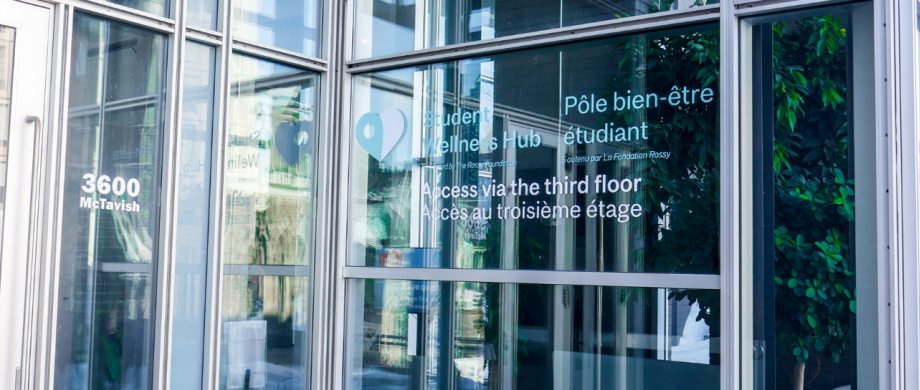Content warning: Mention of suicide
Since its inception in 2019, McGill’s Student Wellness Hub has been marred by a lack of staff, minimal support from other university infrastructures, soaring demand for appointments, and the COVID-19 pandemic. As a result, students have struggled to book appointments and are often left to navigate Quebec’s understaffed and overwhelmed health care system.
Across Canadian universities, 30 per cent of students experience clinical depression and roughly 65 per cent of students report feeling overwhelming anxiety at least once. In Quebec, one in five people will experience mental health issues throughout their lifetime, but only about half of them will seek professional help. There are currently an estimated 155,864 mental health and substance use health care providers in the province—approximately 1,817 providers per 100,000 people. Despite this, many Quebecers report difficulty accessing care: In the most dire cases, lives are lost because of the system’s inadequacy. Jeremiah Wallace, a Quebec resident, has experienced the failings of the health care system firsthand.
In May 2022, Wallace’s daughter, Hannah, took her own life after a battle with depression and other mental health issues. (Wallace suspects Hannah may have had undiagnosed bipolar disorder.) Hannah was an education student at McGill and an Arts and Culture editor at The Bull and Bear, a student-run magazine published by the Management Undergraduate Society. In an interview with The McGill Tribune, Wallace described his daughter as a talented writer, an avid reader, and an overall wonderful person who was failed by the systems charged with caring for her. He believes that Hannah’s past suicidal behaviour should have qualified her for more urgent care.
“[McGill] should not have exposed [Hannah] to the inadequacies of the Quebec health care system,” Wallace said. “She was definitely eligible after a suicide attempt for somebody to take care of her, to watch her [….] My daughter had a nervous breakdown and a psychological breakdown, [yet] she was not able to avail special services.”
Wallace is now channelling his grief into advocating for better mental health care on campus.
“I think [McGill] needs to improve their health care plan to have unlimited counselling. If somebody really needs it, they should be able to see a counsellor every day,” Wallace said. “Don’t say you are hiring one counsellor, that’s not enough. Tell me you are hiring 10 counsellors per year; tell me you are going to tell the next [donor] that shows up […] to spend money on [mental health].”
McGill’s Wellness Hub is currently the main point of contact on campus for students looking to access mental health services. It is not, however, equipped to help students in crisis requiring immediate attention. In a written statement to the Tribune on behalf of the Wellness Hub, Frédérique Mazerolle, a McGill media relations officer, explained that “emergency care for students in crisis is not part of the Wellness Hub’s mandate,” because the Hub does not have the means—financially or staff-wise—to provide such services.
“We have connected with the Faculty of Medicine and Health Sciences to recruit graduates and are exploring more innovative digital recruitment approaches to adapt to an ever-changing Quebec job market,” Mazerolle wrote. “It is important to note, however, [that] crisis care requires a range of highly specialized services working together, around the clock, that the Wellness Hub is not equipped to provide.”
The Students’ Society of McGill University (SSMU) mental health commissioner Maya Willard-Stepan added that emergency care is not a part of SSMU’s health care mandate because of its complexity.
“SSMU doesn’t have the level of training or capacity needed to properly intervene in emergencies,” Willard-Stepan explained. “Currently at McGill, emergency cases are tended to through the Office of the Dean of Students, not any student group or the Wellness Hub.”
The Office of the Dean of Students (ODoS) employs case managers who work with students experiencing mental health difficulties and members of the McGill community who are worried about a student’s well-being. According to Willard-Stepan, case managers can streamline access to clinicians and other counsellors at the Wellness Hub so that students do not have to navigate the process of booking an appointment on their own.
“If there is a student who is either a survivor of a suicide attempt or someone who is experiencing suicidality, when the situation is no longer an emergency, ODoS has referral power to clinical counsellors at the Hub,” Willard-Stepan said. “You do not have to go through normal pathways.”
Accessing care through the Wellness Hub is notoriously difficult. Students have reported wait times of up to nearly three months for an appointment with a mental health care provider. While the Wellness Hub employs nurses, they can only write prescriptions for birth control medication and “smoking cessation tools.”
Wallace takes particular issue with McGill’s accommodation policies. Though he feels that an extension for a final project would not have changed Hannah’s mental state, an extended break may have been enough to allow him to find her proper care.
“She [sent] an email to a professor and said ‘I need an extension, I tried to commit suicide,’” Wallace alleges. “His response was ‘talk to your [teaching assistant]’.”
As the SSMU mental health commissioner, Willard-Stepan is responsible for advocating on behalf of students during meetings with the McGill administration. This semester, Willard-Stepan must also prepare for the renewal of SSMU’s Mental Health Policy, which expires on May 1, 2023. In order to forge a policy that responds to the evolving needs of students, Willard-Stepan is holding community consultation meetings.
One of Willard-Stepan’s goals for the coming policy is to better acknowledge intersectionality—BIPOC and 2SLGBTQIA+ students face many more barriers to care than white, cisgender, heterosexual students. The Wellness Hub currently has one wellness advisor dedicated to serving 2SLGBTQIA+ students, but the wellness advisor supporting Black students position is currently vacant. Mazerolle confirmed, however, that the Hub employs a diverse counselling team “with representation from BIPOC and 2S&LGBTQIA+ communities” and that “all staff at all levels are trained in [equity, diversity, and inclusion] informed practices and care.”
“I think that in the past few years, we’ve seen a lot of progress and understanding of how your intersection of identities impacts your health and also impacts your access to health,” Willard-Stepan explained. “Equitable access to health care is social justice.”
Also on the docket for Willard-Stepan next semester is the finalization of a suicide prevention framework. Currently, McGill has a postvention—after the fact—framework that is implemented in the case of a death on campus. There is no framework in place if a student dies off campus apart from formal procedures like cancelling their registration and lowering flags on campus to half-mast. Willard-Stepan is looking forward to developing a preventative framework that will hopefully help students when they are in crisis rather than post-crisis.
“[The framework] is designed to create a preparedness plan at McGill so that when there is a death on campus or when there is someone experiencing suicidal thoughts, there is a document that gives people the knowledge of what they can do, and when their role stops and they need more support,” Willard-Stepan said.
While advocating for a reform of McGill’s and Quebec’s mental health care systems, Wallace is also calling on the Faculty of Education to commemorate Hannah in some way and to acknowledge that there is a mental health crisis on campus. In the meantime, he is focused on remembering his daughter as the beautiful, brilliant person she was.
“Hannah wrote several novels [….] She was a huge fan of Taylor Swift, Glee, and Love Simon, and before there was Love Simon, there was The Perks of Being a Wallflower,” Wallace wrote in a follow-up email to the Tribune. “She likely read 5,000 novels. When she died, it was a bit like the fire in Alexandria.”
Students in crisis should contact Suicide Action Montréal at 1-866-277-3553. For an appointment with a doctor, wellness advisor, or mental health counsellor, students can contact case managers at the Office of the Dean of Students, call the Wellness Hub at 514-398-6017 Monday through Friday, or go to the Hub’s website for more information. To consult with the SSMU mental health commissioner, email [email protected].









This article states nothing new, the conversation is an old one and it relates to the walls of Academia that separate the community which the university sits from the activities that take place within those walls, in a lot of areas. Universities specialize in providing education, within a specific framework of what constitutes knowledge within its walls. Health care providers, specialize in providing health care and that is their role in our society. Academia ought never to extend itself beyond its mandate, because the environment within these walls create some of the conditions that we seek assistance from health care professionals, especially mental health challenges whether persistent, situational, severe or other descriptive “measures.”
Take a look at the report generated in 2018 by the Ontario Government that spoke to University Student Mental Health. What McGill is lacking, is engagement with the student population in a meaningful way. Even the NDP indicated that students were left out of a national inquiry into work that is also done by students across the country.
The “student unions” that exist only represent you, if they know what you think or what your position is on the matter. Ask yourself, “When was the last time anyone asked what I think?” and then determine if people that claim to do so, in fact should!
Link to document on University Student Mental Health:
https://mcgill-my.sharepoint.com/:b:/g/personal/timothy_mtpleasant_mail_mcgill_ca/ERUdTF_it9VJn9KV8FEzew0BtYiqA4dF1aJ6UNzJhJWoFA?e=dktHXd
Pingback: McGill announces creation of postvention framework during Quebec Suicide Prevention Week - The McGill Tribune